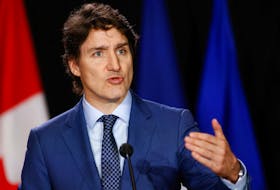To say Newfoundland and Labrador’s financial situation is dire would be an understatement. While the current $1.8-billion deficit is worrying, the province’s post-pandemic, long-term deficit forecast of $915 million should be even more worrying.
This long-term deficit, which the independent Parliamentary Budget Officer calls a “fiscal gap,” represents the difference between the cost of the government’s programs and its revenue sources as they are, and what it would take for them to be sustainable.
To put it in perspective, this $915 million would be equivalent to either 65 per cent of all Newfoundlanders and Labradorians income tax bills, or 70 per cent of the province’s education budget. It is a whole lot of money.
It’s clear that what’s required to bring the budget closer to long-term sustainability is not just a series of quick fixes and small efficiency savings here and there, but rather bold and decisive actions.
Unfortunately, none of the party leaders currently running for the top job has proposed anything concrete.
While the governing Liberals try their best to distance themselves from their Premier’s Economic Recovery Team, both the Progressive Conservatives and the New Democrats are too busy attacking it to suggest a clear path forward.
The Liberals and the PCs have paid lip service to the issue, with the former angling for a negotiated federal bailout and the latter promising economic growth and renegotiating the unfair equalization formula.
Unfortunately, none of the party leaders currently running for the top job have proposed anything concrete.
Whatever the merits of those proposals, they won’t be enough to solve the province’s fiscal woes and close this $915-million gap towards sustainability. And the longer it takes to make and implement those proposals, the harder it will be to tackle the problem.
That’s because every single year that passes without addressing the issue leads to more and more debt, and therefore more and more taxpayers’ money going towards interest payments.
As it stands, the interest charges on Newfoundland and Labrador’s $16-billion debt are poised to cost taxpayers $1.5 billion this year. That’s $100 million more than the province expects to collect through income taxes.
Cuts in government employee spending, whether in compensation packages or in the number of employees, are unavoidable.
Paying government employees costs 42 cents out of every dollar the government spends. It is the biggest source of expenditure by far, and trying to get back to sustainability while keeping it intact — or handing out raises as Premier Andrew Furey did mere days before the election was called — would require making much deeper cuts in transfers to people in need or in services available to the population.
It’s also important to note that provincial government employees in Newfoundland and Labrador enjoy five per cent higher paycheques than their private-sector counterparts, even after adjusting for educational credentials. Bureaucrats also have more employment benefits than private-sector taxpayers could only dream of.
Take employer-provided pension plans for instance. While nearly 90 per cent of all government employees working in Newfoundland had access to one, a mere 25 per cent of their private sector counterparts did. This adds to the existing salary discrepancy between government employees and the private sector taxpayers that are stuck with the bill.
A recent policy brief from the C.D. Howe Institute showed spending on government employee compensation in Newfoundland and Labrador was 16 per cent higher than that of other Atlantic provinces in the last two decades.
Bringing government employee compensation costs in line with what the private sector provides for equivalent positions, or at the very least bringing it in line with its Atlantic peers, would significantly help to close that fiscal gap and dig the province out of its current financial hole.
A 15 per cent reduction in compensation costs, for instance, would bring the budget $615 million closer to sustainability. Would that solve the entire problem? No, the province would still be about $300 million short. But it would be a huge step forward.
And while it may be no crowd-pleaser, it’s the kind of serious and honest discussion Newfoundlanders and Labradorians deserve to get from those vying for the province’s top job.
Renaud Brossard,
Interim Atlantic director
Canadian Taxpayers Federation









